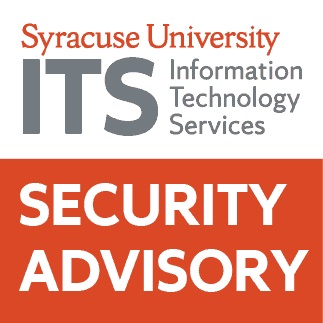Chancellor Syverud Updates Senate on University Finances, Enrollment, Leaders and Shared Governance
Good afternoon. Welcome to a new year of University Senate. This is my last “first” senate meeting of the year as chancellor. I had to miss the last Senate meeting of this past year, which I regret. I have now…


 Information Technology Services (ITS) urges you to be vigilant. Email scammers are becoming more creative and are making their emails look like they are coming from official University offices and syr.edu accounts.
Information Technology Services (ITS) urges you to be vigilant. Email scammers are becoming more creative and are making their emails look like they are coming from official University offices and syr.edu accounts.